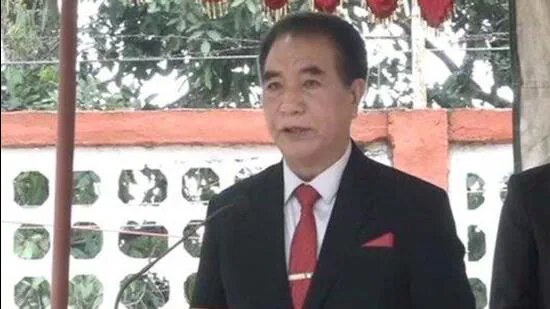The Manipur government has issued a scathing response to Mizoram Chief Minister Lalduhoma, accusing him of promoting division and secessionist agendas. Highlighting concerns over illegal immigration and cross-border trafficking, the government alleged that Lalduhoma’s remarks align with a larger effort to carve out a “Kuki-Chin Christian nation” across parts of Myanmar, India, and Bangladesh.
By PC Bureau
New Delhi
The Manipur government has sharply criticized Mizoram Chief Minister Lalduhoma, accusing him of “stoking the fire of hatred and division” through “unwarranted comments.”
In a strongly worded statement, the Manipur government alleged that Lalduhoma’s remarks align with a larger agenda aimed at establishing a “Kuki-Chin Christian nation” across contiguous areas of Myanmar, India, and Bangladesh, describing it as the result of decades of meticulous planning.
The statement emphasized that Manipur would not permit any attempts to fragment the Northeast at the behest of “foreign vested interests” or “secessionist agendas openly supported by the Mizoram CM.”
The government criticized Lalduhoma for advocating the imposition of President’s Rule in Manipur, opposing border fencing along the Indo-Myanmar border, and supporting the reunification of the Zo people. It also pointed out his remarks regarding armed militias in Manipur potentially targeting Delhi, calling for their disarmament and advocating negotiations with hill leaders.
This statement came in response to Lalduhoma’s recent interview with the Hindustan Times, where he described Manipur Chief Minister N Biren Singh as a liability to the state and the BJP, stating that President’s Rule would be preferable to the current administration.
The Manipur government also criticized Lalduhoma’s skepticism over the effectiveness of border fencing, noting his argument that smuggling of arms, drugs, and other contraband persisted along the Indo-Bangladesh border despite fencing there. It accused the Mizoram government of opposing central efforts to secure open borders with Myanmar, meant to address illegal immigration, arms trafficking, and national security concerns.
The statement further attributed the ongoing unrest in Manipur to illegal immigrants from Myanmar, whose poppy-driven economy suffered under the state’s “War on Drugs.” It rejected allegations of anti-tribal policies as false narratives perpetuated by Lalduhoma, stressing that Manipur has a history and culture spanning thousands of years, in contrast to Mizoram, which was carved out of Assam relatively recently.
The Manipur government highlighted the significant increase in villages in Kuki-dominated hill districts, questioning the underlying factors and urging Mizoram to recall its own restrictions on land purchases and business activities by Myanmar nationals to address similar concerns.
It touted the success of its anti-drug operations, claiming the seizure or destruction of drugs worth ₹60,000 crore since 2017 and a near cessation of drug transit through Manipur. In contrast, it alleged that Mizoram has become a favored route for international smuggling of arms, ammunition, and drugs between India and Myanmar.
The government urged Lalduhoma to focus on the impact of the drug trade on Mizoram society rather than criticizing Manipur’s anti-drug measures as “anti-tribal.” It also underscored its commitment to restoring peace in Manipur, citing ongoing relief efforts for over 60,000 displaced persons and combing operations to recover stolen arms and ammunition.
The statement warned of a calculated agenda to create a “Kuki-Chin Christian nation” through illegal immigration, land grabs, and the displacement of indigenous populations, ultimately leading to demands for autonomy and nationhood. It also cautioned against attempts to “push” illegal immigrants into Manipur to advance the idea of a “Greater Mizoram.”
Reaffirming its stance, the Manipur government declared that any individual or group working to fragment Northeast India would face legal consequences. It called on Lalduhoma to act as a “good neighbor” and desist from actions that fuel hatred and division.














